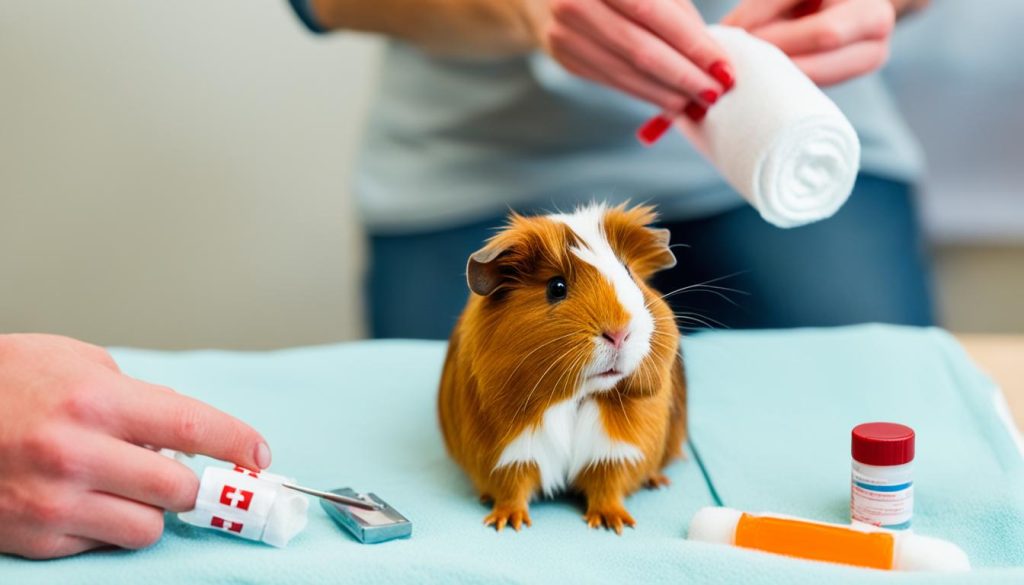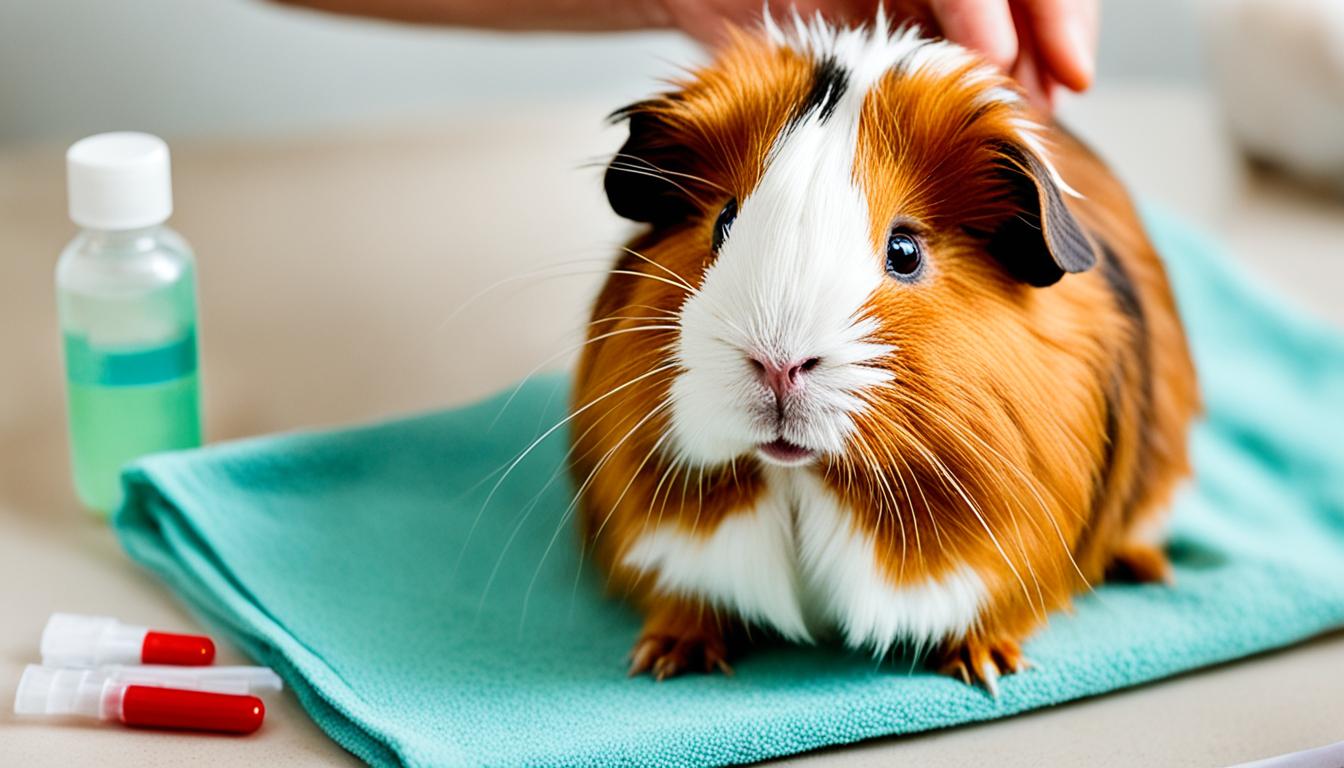Understanding first aid for Abyssinian guinea pigs is crucial for their health and happiness, serving as a cornerstone of responsible pet care. This knowledge can transform emergency situations from potentially life-threatening to manageable, ensuring you’re prepared to act swiftly when needed.
Equipping yourself with the right health tips and first aid techniques is vital for your guinea pig’s well-being. This guide offers essential insights into first aid and daily care practices, empowering you to support your cherished companion’s health confidently. Discover life-saving tips that will prepare you for any health emergencies, fostering a safe and nurturing environment for your Abyssinian guinea pig.
Understanding Your Abyssinian Guinea Pig’s Health
Ensuring your guinea pig’s well-being requires a keen eye for their behavior and physical condition. Staying informed about the potential health risks and knowing how to respond to guinea pig health emergencies can make all the difference.
Being proactive with guinea pig veterinary care and recognizing symptoms early on assists in treating injuries in guinea pigs effectively and caring for a sick guinea pig with the best chance of recovery.
Signs of a Healthy Abyssinian Guinea Pig
A robust appetite and lively activity are some of the most obvious signs your guinea pig is thriving. Look for a coat that’s soft and free from pests, along with bright, clear eyes. These indicators serve as a baseline for determining the onset of potential health issues.
Here, preventative care is key, and understanding the normal behavior and appearance of your pet will alert you to any changes that may require attention.
Common Health Issues in Guinea Pigs
Even with the best care, guinea pigs can fall prey to a range of health issues. Vitamin C deficiency, leading to scurvy, is a common concern, as well as dental problems due to their continuously growing teeth.
You should also be vigilant for signs of respiratory infections and be aware of skin complications that might signal mites or fungal infections like ringworm.
A diet too rich in calcium can contribute to urinary problems, and reproductive complications can occur, especially in unspayed females.
The Importance of Regular Vet Visits
One of the most critical steps in maintaining your guinea pig’s health is scheduling regular vet visits. A veterinarian who specializes in exotic pets can offer invaluable advice on preventing common ailments and provide timely treatment when health emergencies arise.
These visits can potentially identify concerns before they become serious, ensuring the longevity and happiness of your guinea pig.
By establishing a relationship with a vet, you’re not only investing in your pet’s health but also equipping yourself with the knowledge to manage their well-being effectively at home.
First Aid for Abyssinian Guinea Pigs

When your Abyssinian guinea pig faces an emergency, knowing the right first aid procedures can make a major difference. Acting swiftly and confidently is crucial during a guinea pig emergency situation. Below, we provide essential tips to help you manage such crises with the necessary emergency care for guinea pigs.
Let’s start with identifying symptoms that require urgent attention. If you observe your guinea pig exhibiting lethargy, difficulty breathing, or signs of injury, it’s important to administer guinea pig first aid promptly. Here’s what you can include in your emergency kit:
- Disinfectants to clean any wounds
- Antiseptic wipes
- Sterile gauze for bandaging
- Vitamin C supplements, as guinea pigs cannot produce their own
- A syringe for feeding or administering fluids, if necessary
- Information on your local exotic vet for immediate consultation
Creating a stress-free environment is an important aspect of First Aid for Abyssinian Guinea Pigs. Ensure your pet is in a quiet, comfortable space away from loud noises and other pets that might cause stress. Use the following tips to provide immediate care while preparing to visit the vet:
- Calmly and gently assess your pet for visible signs of distress or injury.
- Administer first aid treatments such as wound cleaning or offering Vitamin C if you’re experienced with these actions.
- Contact your vet immediately, even if you’ve provided first aid care, for professional medical advice.
Remember not to attempt administering any medications or complex treatments without veterinary guidance, as this might worsen the situation. Always prioritize getting professional help in case of a guinea pig emergency situation. Your swift actions can save your pet’s life.
Creating a Safe and Healthy Habitat
Your Abyssinian guinea pig’s well-being depends heavily on their living conditions. By focusing on the right elements, you can ensure they have a comfortable and nurturing environment that promotes optimal health.
From selecting an appropriate cage to maintaining clean living spaces, here are specific guidelines for Abyssinian guinea pig care.
Choosing the Right Cage
Size matters when it comes to housing your furry friend. Experts recommend a minimum of 7.5 square feet for one guinea pig and an additional 2 to 3 square feet per additional pig. This space allows for proper exercise and minimizes stress, contributing to overall guinea pig health tips. Consider a cage with a plastic bottom to avoid injuries and make cleaning easier.
Bedding and Hygiene Essentials
The type of bedding you choose plays a vital role in controlling odors and preventing health issues. Paper-based products like CareFresh® are absorbent and dust-free, making them an ideal choice.
Maintaining a clean habitat is crucial, so aim to remove soiled bedding daily and replace it entirely every week.
Similarly, ensure food dishes and water bottles are sanitized regularly to prevent the spread of bacteria.
Enrichment: Tunnels and Hideouts
Abyssinian guinea pigs have a natural instinct to explore and hide, so incorporating tunnels and hideouts in their habitat is highly beneficial. These not only provide mental stimulation but also give them a sense of security.
Enrichment items can be store-bought or homemade, as long as they’re safe and guinea pig-friendly.
| Enrichment Item | Benefits | Considerations |
|---|---|---|
| Tunnels | Promotes exercise and satisfies burrowing instincts | Select materials that are chew-safe and non-toxic |
| Hideouts | Provides a retreat for privacy and resting | Ensure there’s enough air circulation to prevent overheating |
| Chewing Toys | Facilitates dental health by wearing down teeth | Must be made from untreated wood or safe, edible materials |
Nutrition and Dietary First Aid
When it comes to Abyssinian guinea pig care, paying attention to diet is non-negotiable. Just as you’d stock your medicine cabinet with essentials, so too should your guinea pig’s pantry be equipped for both everyday nourishment and nutritional first aid.
A robust diet is your first line of defense against common health concerns. This includes a plentiful supply of fresh Timothy hay, foundational for digestive and dental health, and specially formulated guinea pig pellets, which are high in fiber and enriched with Vitamin C vital for your pet’s well-being.
FAQ
What are the signs of a healthy Abyssinian guinea pig?
A healthy Abyssinian guinea pig typically exhibits an eagerness to eat, an energetic demeanor, a coat that is soft and well-kept without any parasites, and eyes that are clear and free from any discharge.
What are some common health issues in guinea pigs?
Common ailments in guinea pigs include scurvy due to Vitamin C deficiency, dental problems, respiratory infections, and skin issues such as mite infestations or fungal infections like ringworm. They can also suffer from urinary complications from excessive calcium intake and reproductive problems.
Why is regular veterinary care important for guinea pigs?
Regular vet visits are crucial for identifying and preventing health issues in guinea pigs, ensuring their longevity and well-being. A vet can provide essential check-ups and timely interventions for any arising health concerns.
How can I provide emergency care for my guinea pig?
In an emergency, you should first check for any immediately visible injuries or symptoms and provide basic first aid if confident to do so. Always contact your vet for guidance on handling the situation. Having an emergency kit with supplies like disinfectants, gauze, and Vitamin C supplements is advisable.
What should be included in guinea pig first aid nutrition?
Your guinea pig’s diet should be centered around fresh Timothy hay, high-fiber guinea pig pellets fortified with Vitamin C, and a variety of fresh fruits and vegetables. Avoid high-calcium foods and consult with your veterinarian on supplementary feeding, especially in cases of illness or recovery.

